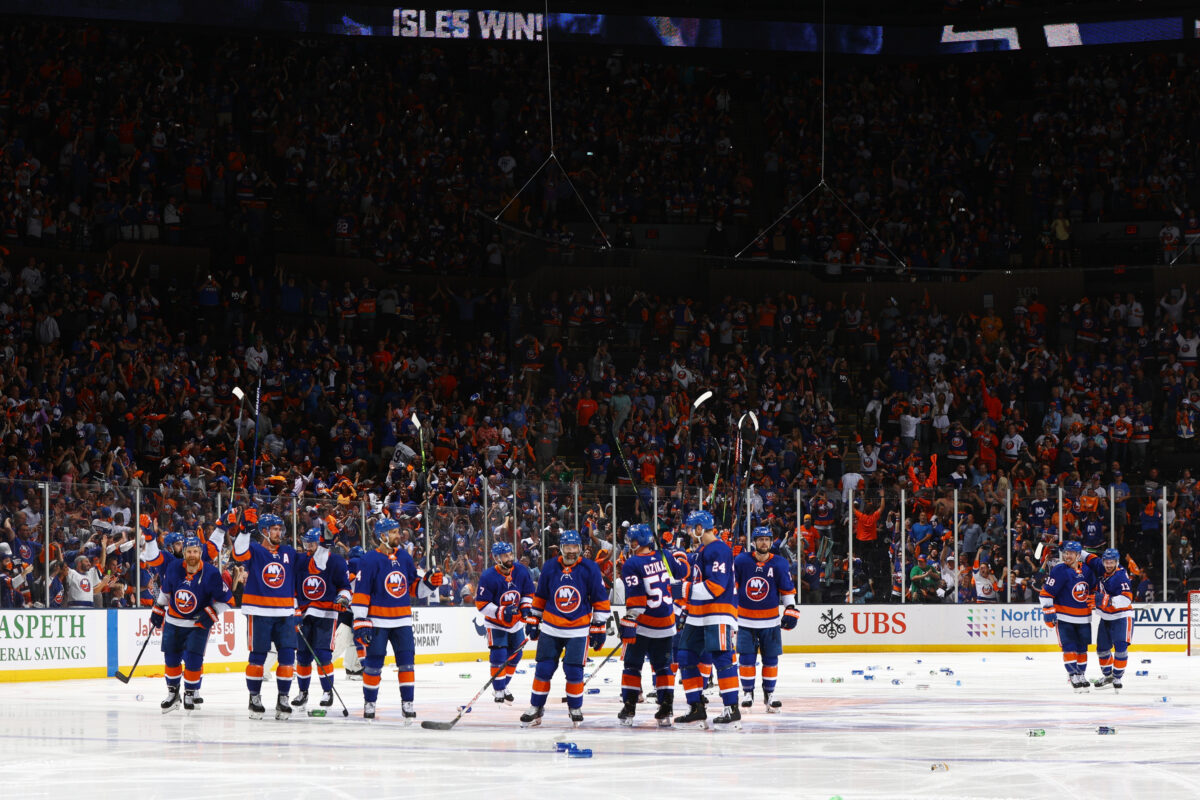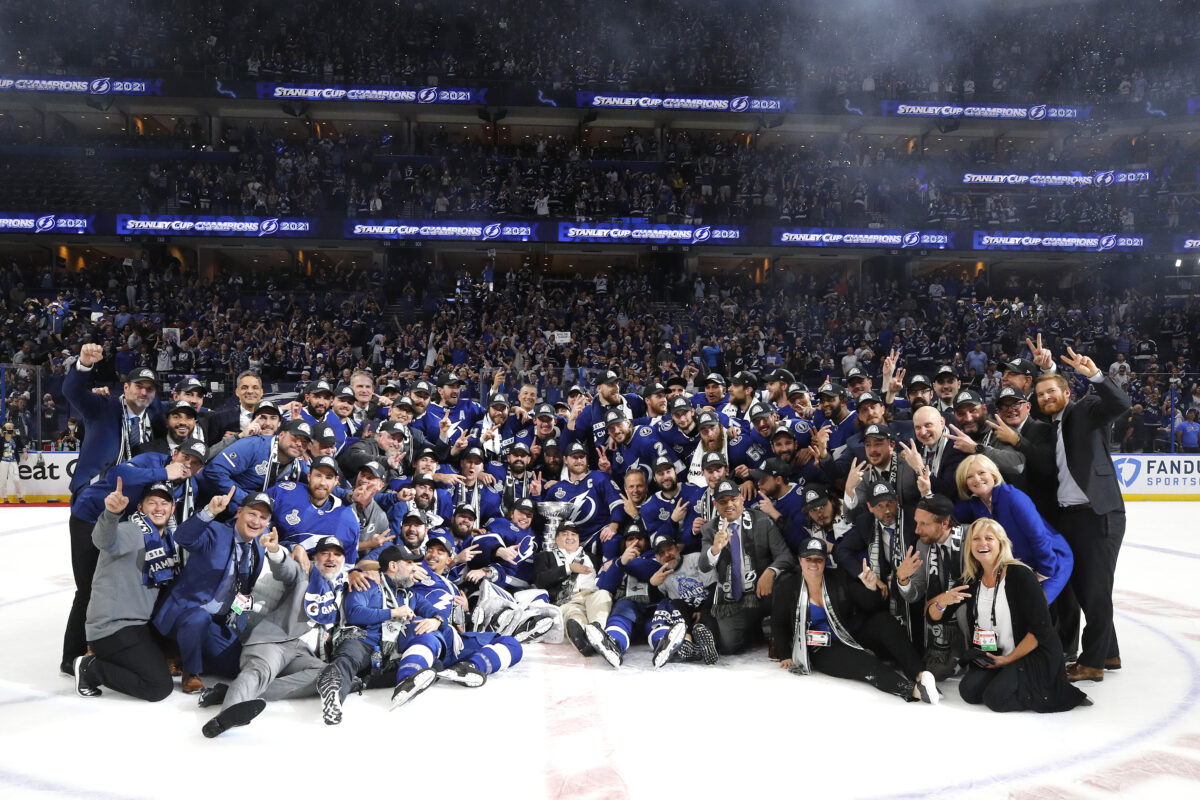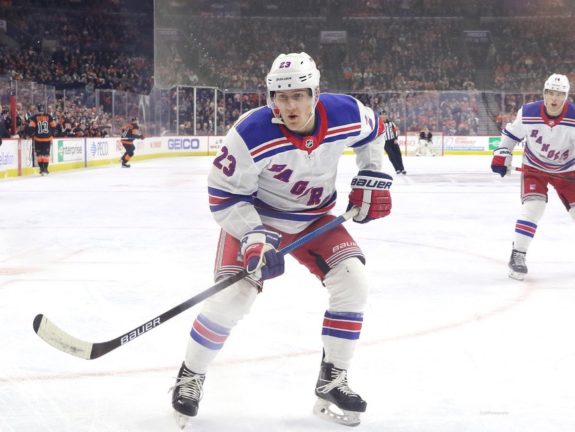The NHL is filled with ideas and cliches that have been a part of the game for years and have been accepted as fact. Fans and analysts alike oftentimes reference what seems like common knowledge in the game, but are simply myths or have no factual backing. As the sport continues to think more analytically and accumulate data, we are starting to see some hockey myths debunked, but unfortunately, there are still some that are prominent in the game.
You Can’t Repeat as Champions
The NHL has more parity than ever before, and after winning the Stanley Cup, it becomes an even taller task to repeat as champions. Granted, with 32 teams in the league compared to the handful that existed throughout the history of the league, the competition is tougher, the season is longer, and the talent is spread out, preventing teams from becoming dynasties and going back-to-back as Stanley Cup Champions. However, history has indicated that consecutive champions are frequent, as are dynasties in the NHL.
For starters, the Tampa Bay Lightning just won their second consecutive Stanley Cup to conclude the 2021 Stanley Cup Playoffs with a 4-1 series victory over the Montreal Canadiens. The Lightning were the first team to repeat since the Pittsburgh Penguins did so in the 2015-16 NHL season and the 2016-17 NHL season, respectively. While the Penguins were the first team to repeat as champions since the Detroit Red Wings in 1998, there have been 10 repeat champions since 1970, with the Canadiens and New York Islanders winning four consecutive championships in the 1970s and early 1980s.

Moreover, the history of the NHL has plenty of dynasties and teams that can stay atop the league for years, accumulating multiple Stanley Cup Championships. The “Original Six” era was commonplace for dynasties, but even in recent years, the Chicago Blackhawks won three Stanley Cups in the span of six seasons, the Red Wings won four in the span of 11 seasons, and the Edmonton Oilers won five in seven seasons, albeit, in the 1980s when the league had far less parity than it does now. The fact is that the NHL is built for teams to be balanced and for dynasties or repetitive champions to be rare, but teams that are well built and managed correctly will find a way to compete for the Stanley Cup each season.
Home-Ice Advantage
It has become a staple of hockey commentary that a team will have a “home-ice advantage” or have an edge playing in front of their home crowd. This idea allows home fans to feel like they are impacting the game or helping their team on the ice, especially in the playoffs when their team needs the support. The fans are great for the game, and there is a comforting feeling about playing at home, but is there a distinct advantage about the location or arena in which the game is played?

Statistically, teams are better at home but only slightly and not by an overwhelming number. Looking at the past season’s records for all the teams in the NHL, it’s clear that home teams played better than the road team, but it wasn’t an obvious advantage.
2020-21 Home Record: 463 wins in 868 games (all 31 NHL teams)
2020-21 Road Record: 405 wins in 868 games
The home teams won 58 more games in the regular season than the road teams or 53.3 percent of their games. The number shows how playing on home ice helped, but it wasn’t a distinct advantage considering all 31 teams and each team playing 28 home games over the course of the previous season. The argument can be made that this past season didn’t offer a true home-ice advantage, considering the majority of the 2020-21 NHL season was played in empty arenas or with limited capacity, but looking at the 2018-19 NHL season, the last 82-game regular season, a similar split is seen.
2018-19 Home Record: 682 wins in 1,271 games
2018-19 Road Record: 589 wins in 1,271 games
The win percentage of the home teams remained similar to the recent season, with the home teams winning 53.6 percent of games. The bottom line is that home teams play better, but not to the extent that they have a distinct advantage. Similarly, many people will cite good teams, especially in the playoffs, possessing a home-ice advantage, which again is simply not the case. The Lightning, who won the Stanley Cup, went 9-3 at home, but also went 7-4 on the road in the 2021 Stanley Cup Playoffs.

Likewise, the Presidents’ Trophy-winning Colorado Avalanche won an unprecedented 22 of their 28 games at home the past season but also won 17 games on the road (60.7 percent of games). In the end, the good teams will win regardless of where they play, and the bad teams will play poorly regardless of whether they are at home or not.
Clutch Goal Scorers
In all sports, there is an idea that a player is clutch and can find a way to succeed in high-pressure situations. In hockey, the clutch scorer is common for skaters that can score in the final minutes of a game or the playoffs — simply, they have that scoring instinct when their team needs it the most. Unfortunately, there isn’t a clutch scorer, and players that can score in the final minutes of a game can score at any point in a game (they are just good scorers).
The first problem with labeling a scorer as a clutch scorer is that there aren’t definite metrics for measuring clutchness. Specifically, there is data behind when a skater scores and how that impacts a game and the team’s chances of winning, but there aren’t many skaters that can consistently score in given situations, such as the final two minutes of a game, overtime, game-winners or in the playoffs. Auston Matthews, who scored 41 goals to win the Maurice “Rocket” Richard Trophy, for example, scored 12 game-winning goals in the 2020-21 NHL season but only scored five game-winning goals in each of the previous two seasons.
Similarly, Leon Draisaitl, who scored 18 game-winning goals in the previous two seasons, scored only 14 game-winning goals in the first five seasons of his career. Both Matthews and Draisaitl can’t be classified as clutch scorers — rather they are good goal scorers in general, scoring 30 or more goals in each of the past two seasons.

Additionally, it’s easy to label some players as playoff goal scorers or skaters who have that instinct for finding the back of the net, especially when a third-line skater suddenly scores a handful of goals in the playoffs after struggling in the regular season. Aside from production fluctuating from one playoff run to the next, the instances of these skaters finding the back of the net say more about how playoff games develop and how the opposing defenses eliminate the top skaters on the offensive end of the ice, daring later line skaters to beat them. Kyle Palmieri, for example, scored seven goals in the 2021 Stanley Cup Playoffs after only scoring 10 goals in the regular season, but many of his goals came as a result of his shift playing alongside Jean-Gabriel Pageau, finding open shots on the net, and the opposing defense eliminating the top line and forcing the later shifts to find scoring chances.
The bottom line is that goal scorers will find a way to score, and goals can occur at any point of the game, making some of them appear clutch. Likewise, there will be skaters that can consistently score in overtime or the final two minutes over the course of a given season, but their clutch numbers will fluctuate from one season to the next. The idea that skaters become better players or better scorers at the end of the game is more myth than factual.
Defensemen Need to Be Enforcers
Throughout the history of the game, there have always been defensemen that could impose their will and allow their presence on the ice to strike fear into the opposing forwards. The enforcing presence has been a staple of the position, with many great defensemen like Larry Robinson, Scott Stevens, and Zdeno Chara making their mark as a hard-hitter that could remove skaters from the puck or prevent them from establishing a presence near the crease. While many teams try to acquire defensemen with the enforcing presence, it is not a necessity for the position and is slowly being fazed out of the game or evolving as the game rapidly changes.

The younger defensemen in the NHL are proving that the position no longer requires someone who can deliver a game-changing hit or have a large physical presence. Adam Fox, who won the Norris Trophy, is part of a young generation of defensemen that includes Cale Makar, Charlie McAvoy, and many others that create turnovers on the defensive end of the ice while also helping create offensive opportunities on the odd-man rush or in the offensive zone. With the game becoming faster and more skilled than ever, especially at the forward position, defensemen will need to match that speed with great blue-line skating and the ability to shift turnovers into offense. While the enforcing defenseman is still a part of the game, it isn’t a requirement for many front offices and not a necessary skill for the position and won’t be in the future.
What to Make of Hockey Myths
Hockey myths wouldn’t exist without some backing or preconceived notion for their understanding. The problem is that the myths themselves have often been accepted as factual or a clear part of the game when data or evidence indicates otherwise. In the hockey world, there are common phrases that are used when discussing a player that is acknowledged as valid for evaluating them and determining how they play. As the league and fans alike continue to become smarter in their understanding of the game, it’s important to re-evaluate some of the ideas that have been at the forefront of hockey for the past few decades.